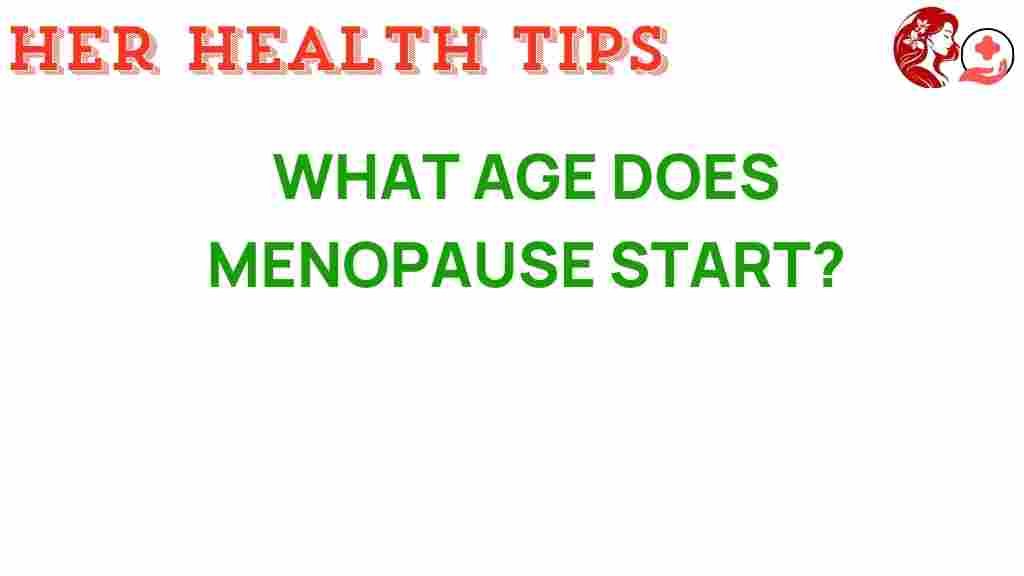Unveiling Menopause: When Does This Life Stage Begin?
Menopause is a significant phase in a woman’s life, marking the end of her reproductive years. It is characterized by a variety of symptoms and hormonal changes that can impact women’s health. Understanding when this transition occurs, what to expect, and how to manage the symptoms can make this life stage smoother and more manageable. In this article, we will delve into the intricacies of menopause, its symptoms, the age it typically begins, and the transitions involved.
Understanding Menopause
Menopause is defined as the point in time when a woman has not had a menstrual period for 12 consecutive months. This life stage is a natural biological process that typically occurs between the ages of 45 and 55, although it can vary widely among individuals. The average age for menopause in the United States is around 51 years.
The Transition: Perimenopause
Before reaching menopause, women typically experience a transitional phase known as perimenopause. This stage can begin as early as the mid-30s and last for several years. During perimenopause, the body undergoes various hormonal changes as estrogen and progesterone levels fluctuate. This can lead to a range of symptoms that signal the approach of menopause.
Common Symptoms of Menopause
As women transition through menopause, they may experience a variety of symptoms, including:
- Hot flashes: Sudden feelings of warmth, often accompanied by sweating.
- Night sweats: Hot flashes that occur during sleep, often disrupting rest.
- Irregular periods: Changes in menstrual cycle frequency and flow.
- Sleep disturbances: Difficulty falling or staying asleep.
- Mood changes: Increased irritability, anxiety, or depression.
- Vaginal dryness: Reduced lubrication, leading to discomfort during intercourse.
- Memory problems: Difficulty concentrating or forgetfulness.
These symptoms can vary in intensity and duration, making it crucial for women to understand what to expect during this life stage.
Age and Menopause
The age at which menopause begins can differ significantly among women. Factors influencing the timing of menopause include:
- Genetics: Family history can play a role in determining when a woman will reach menopause.
- Health conditions: Certain medical conditions and treatments, such as chemotherapy, can induce early menopause.
- Lifestyle factors: Smoking, obesity, and diet can influence the onset and severity of symptoms.
Understanding these factors can help women prepare for and manage the transition into menopause more effectively.
The Role of Hormonal Changes
During menopause, the body’s production of hormones, particularly estrogen and progesterone, decreases significantly. These hormonal changes are responsible for many of the symptoms associated with this life stage. For example:
- Reduced estrogen: This can lead to hot flashes, night sweats, and vaginal dryness.
- Decreased progesterone: This can affect menstrual cycles and contribute to mood swings.
Women’s health during menopause is closely linked to these hormonal fluctuations, making it essential to monitor and manage symptoms effectively.
Fertility and Menopause
As women approach menopause, their fertility declines. This is particularly noticeable during perimenopause, when ovulation becomes irregular. Women may still conceive during this time, but the chances are significantly lower. Understanding fertility in relation to menopause is crucial for women who may be considering pregnancy later in life.
Steps to Manage Menopause Symptoms
Managing the symptoms of menopause can greatly improve quality of life during this transition. Here are some steps women can take:
- Stay informed: Understanding the symptoms and changes associated with menopause can empower women to seek appropriate care.
- Consult healthcare professionals: Regular check-ups can help monitor health and manage symptoms effectively.
- Consider hormone replacement therapy (HRT): This may be an option for some women to alleviate severe symptoms.
- Adopt a healthy lifestyle: Regular exercise, a balanced diet, and maintaining a healthy weight can mitigate some symptoms.
- Practice stress-reduction techniques: Yoga, meditation, and other relaxation methods can help manage mood swings and anxiety.
Troubleshooting Tips for Managing Menopause
Managing menopause symptoms can be challenging, but there are several troubleshooting tips that may help:
- Keep a symptom diary: Track symptoms and their severity to identify patterns and triggers.
- Stay cool: Dress in layers and keep fans nearby to manage hot flashes.
- Use water-based lubricants: This can alleviate vaginal dryness during intercourse.
- Seek support: Join support groups or talk with friends who are experiencing similar transitions.
- Educate yourself: Read books and articles about menopause to better understand what to expect.
For more comprehensive guidance on women’s health during menopause, consider visiting this resource.
Conclusion
Menopause is a natural life stage that every woman will experience, typically occurring between the ages of 45 and 55. Understanding the symptoms, age factors, hormonal changes, and how to manage this transition can empower women to navigate this phase with confidence. By staying informed and proactive, women can embrace menopause as a new chapter in their lives, focusing on their overall health and well-being.
For ongoing support and information about women’s health, check out this external link to stay updated on resources available for managing menopause and beyond.
This article is in the category Reproductive and created by HerHealthTips Team
